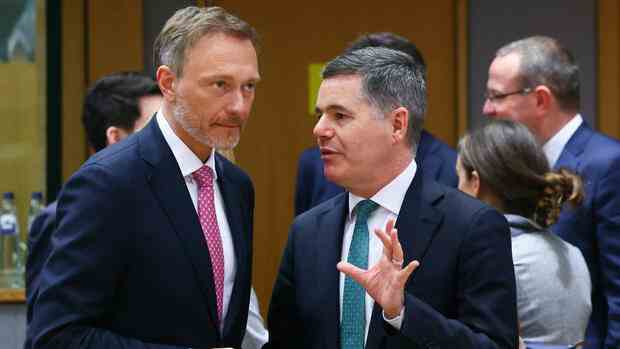Brussels The reform of the European debt rules is likely to be delayed again. Federal Finance Minister Christian Lindner called for last-minute improvements to the conclusions that the 27 EU finance ministers wanted to adopt on Tuesday.
The draft provides for some important innovations in the Stability and Growth Pact. The set of rules has been suspended since the beginning of the corona pandemic, but is scheduled to come into force again in a reformed form in 2024.
According to the text, the states should in future agree multi-year debt reduction plans with the EU Commission that take into account the different levels of debt in the euro zone. In this way, the ministers want to take account of the sharp increase in debt during the pandemic.
The Maastricht criteria (maximum new debt of three percent of gross domestic product, maximum 60 percent of total debt) should continue to apply. However, states should be given more flexibility when it comes to reducing debt.
FDP boss wants to untie the draft again
The draft had already been approved by the group of EU ambassadors, and Germany had also agreed. This usually means that the ministers just nod the text. But the FDP leader was so annoyed with the EU Commission last week that he still sees a need for clarification.
At a lunch with his colleagues from France, Italy, Spain and the Netherlands, Lindner presented his concerns on Monday stability pact. Many questions are still unanswered, he stressed.
The reason for Lindner’s caution: EU Economics Commissioner Paolo Gentiloni said last week when presenting the budgetary policy recommendations for 2024 that the Commission already wanted to evaluate the fiscal plans of the member states based on the new debt rules.
>>Read here: The EU Commission is again threatening blue letters
Lindner immediately described the Commission’s arbitrary action as “unacceptable”, after all the new rules have not even been decided in principle. On Monday he followed up: The Brussels authorities “do not work in a legal vacuum”. As long as you don’t agree on new rules, the old rules will continue to apply.
Parallels to the debate about phasing out combustion engines
Apparently, Gentiloni’s foray into action reminded Lindner of the debate about phasing out combustion engines. Here, too, the FDP felt deceived by the commission – or at least ignored. According to their own account, Lindner and Transport Minister Volker Wissing have always insisted that e-fuels must also be allowed after 2035.
However, after the EU Commission made no move to implement the German demand, the liberals finally opposed it and blocked the EU climate law. In the meantime, several EU countries have joined the German position on the combustion engine exit.
Other Lindner colleagues in the Euro Group on Monday also jumped in and criticized the Commission’s going it alone on the debt rules. Gentiloni felt compelled to appease: it was a misunderstanding.
Should Lindner prevail with his change requests to the text, the Stabilization Act reform is likely to be postponed again. The commission actually wanted to present its draft law at the end of March. In the best-case scenario, she would now have to ask the Member States about further wishes and suggestions. This can take a few weeks. On the other hand, if the ministers do not agree on a compromise text, the debate could drag on even longer.
More: Germany fears Lex Italia.
